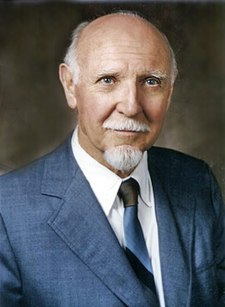
Back رايموند كاتل Arabic Raymond Cattell AST Reymond Kettell Azerbaijani ریموند کاتل AZB Реймънд Кетъл Bulgarian Raymond Cattell Catalan Raymond Cattell Czech Raymond Cattell Danish Raymond Bernard Cattell German Ρέιμοντ Κατέλ Greek
Raymond Cattell | |
|---|---|
 | |
| Born | 20 March 1905 Hill Top, West Midlands, Birmingham, England |
| Died | 2 February 1998 (aged 92) Honolulu, Hawaii, U.S. |
| Nationality | British American |
| Alma mater | King's College London (BSc, PhD) |
| Known for | 16 Personality Factors, Fluid and crystallized intelligence, Culture Fair Intelligence Test |
| Scientific career | |
| Fields | Psychology |
| Institutions | University of Illinois |
| Doctoral advisor | Francis Aveling, King's College London |
Raymond Bernard Cattell (20 March 1905 – 2 February 1998) was a British-American psychologist, known for his psychometric research into intrapersonal psychological structure.[1][2] His work also explored the basic dimensions of personality and temperament, the range of cognitive abilities, the dynamic dimensions of motivation and emotion, the clinical dimensions of abnormal personality, patterns of group syntality and social behavior,[3] applications of personality research to psychotherapy and learning theory,[4] predictors of creativity and achievement,[5] and many multivariate research methods[6] including the refinement of factor analytic methods for exploring and measuring these domains.[7][8] Cattell authored, co-authored, or edited almost 60 scholarly books, more than 500 research articles, and over 30 standardized psychometric tests, questionnaires, and rating scales.[9][10] According to a widely cited ranking, Cattell was the 16th most eminent,[11] 7th most cited in the scientific journal literature,[12] and among the most productive psychologists of the 20th century.[13]
Cattell was an early proponent of using factor analytic methods instead of what he called "subjective verbal theorizing" to explore empirically the basic dimensions of personality, motivation, and cognitive abilities. One of the results of Cattell's application of factor analysis was his discovery of 16 separate primary trait factors within the normal personality sphere (based on the trait lexicon).[14] He called these factors "source traits".[15] This theory of personality factors and the self-report instrument used to measure them are known respectively as the 16 personality factor model and the 16PF Questionnaire (16PF).[16]
Cattell also undertook a series of empirical studies into the basic dimensions of other psychological domains: intelligence,[17] motivation,[18] career assessment and vocational interests.[19] Cattell theorized the existence of fluid and crystallized intelligence to explain human cognitive ability,[20] investigated changes in Gf and Gc over the lifespan,[21] and constructed the Culture Fair Intelligence Test to minimize the bias of written language and cultural background in intelligence testing.[22]
- ^ Gillis, J. (2014). Psychology's Secret Genius: The Lives and Works of Raymond B. Cattell. Amazon Kindle Edition.
- ^ Festschrift for Raymond B. Cattell (1988). The Analysis of Personality in Research and Assessment: In Tribute to Raymond B. Cattell. (2 April, & 17 June 1986). University College London: Independent Assessment and Research Centre (Preface by K.M. Miller). ISBN 0 9504493 1 8
- ^ Cattell, R. B. (1948). Concepts and methods in the measurement of group syntality. Psychological Review, 55(1), 48–63. doi: 10.1037/h0055921
- ^ Cattell, R. B. (1987). Psychotherapy by Structured Learning Theory. New York: Springer.
- ^ Cattell, R. B., & Butcher, H. J. (1968). The Prediction of Achievement and Creativity. Indianapolis: Bobbs-Merrill.
- ^ Cattell, R. B. (1966). (Ed.), Handbook of Multivariate Experimental Psychology. Chicago, IL: Rand McNally.
- ^ Cattell, R. B. (1972). Real base, true zero factor analysis. Multivariate Behavioral Research Monographs 72(1), (1–162). Fort Worth, TX: Texas Christian University Press.
- ^ Cattell, R. B. (1978). The Use of Factor Analysis in Behavioral and Life Sciences. New York: Plenum.
- ^ Books and Monographs of Raymond B. Cattell. Multivariate Behavioral Research, 1984, 19, 344–369.
- ^ Cattell, R. B. (1983). Structured Personality-Learning Theory: A Wholistic Multivariate Research Approach. (pp. 419–457). New York: Praeger.
- ^ Eminent Psychologists of the Twentieth Century [Retrieved 22 October 2015]
- ^ Haggbloom, S. J. et al. (2002). The 100 most eminent psychologists of the 20th century. Review of General Psychology, 6(2), 139–152. doi: 10.1037//1089-2680.6.2.139 (Rankings based on: citations, surveys, and awards/honors)
- ^ Boyle, Gregory J.; Stankov, Lazar; Martin, Nicholas G.; Petrides, K.V.; Eysenck, Michael W.; Ortet, Generos (2016). "Hans J. Eysenck and Raymond B. Cattell on intelligence and personality". Personality and Individual Differences. 103: 40–47. doi:10.1016/j.paid.2016.04.029. S2CID 151437650.
- ^ Cattell, R. B. & Kline, P. (1977). The Scientific Analysis of Personality and Motivation. New York: Academic.
- ^ Cattell, R. B. (1973). Personality and Mood by Questionnaire. San Francisco: CA: Jossey-Bass.
- ^ Cattell, R. B., Eber, H. W., & Tatsuoka, M. M. (1970). Handbook for the Sixteen Personality Factor Questionnaire (16PF). New York: Plenum.
- ^ Cattell, R. B. (1982). The Inheritance of Personality and Ability: Research Methods and Findings. New York: Academic.
- ^ Cattell, R. B. & Child, D. (1975). Motivation and Dynamic Structure. London: Holt, Rinehart & Winston.
- ^ Schuerger, J. M. (1995). Career assessment and the Sixteen Personality Factor Questionnaire. Journal of Career Assessment, 3(2), 157–175.
- ^ Cattell, R. B. (1963). Theory of fluid and crystallized intelligence: A critical experiment. Journal of Educational Psychology, 54, 1–22.
- ^ Cattell, R. B. (1971). Abilities: Their Structure, Growth and Action. Boston, MA:: Houghton-Mifflin.
- ^ Cattell, R. B. & Cattell, A. K. S. (1973). Measuring Intelligence with the Culture Fair Tests. Champaign, IL: IPAT.